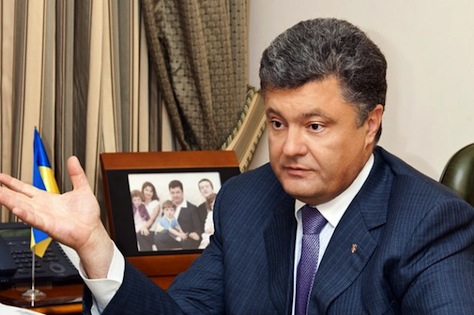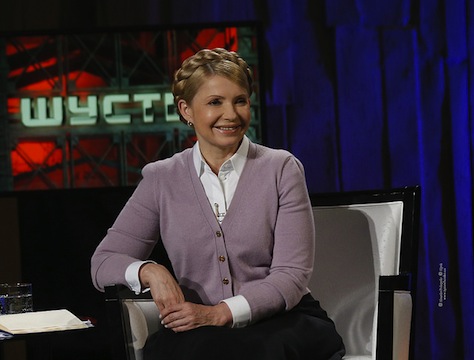Earlier this year, the two undisputed leaders of the pro-Western camp were Yulia Tymoshenko, a former prime minister who had been jailed by the government of then-president Viktor Yanukovych, and Vitali Klitschko, a heavyweight boxing champion who emerged in the 2012 parliamentary elections as the leader of a new reform-minded political party.![]()
Moreover, other capable leaders in anti-Yanukovych movement, including other officials within Tymoshenko’s center-right ‘All Ukrainian Union — Fatherland’ party (Всеукраїнське об’єднання “Батьківщина, Batkivshchyna), such as Oleksandr Turchynov, who ultimately became Ukraine’s acting president, and former foreign minister and economy minister Arseniy Yatsenyuk, who ultimately became Ukraine’s interim prime minister.
So how did a chocolate tycoon with no obvious prior presidential ambitions find his way not only to the top of the polls in Ukraine’s troubled presidential election on May 25, but gather such an overwhelming lead that he could win the race in the first round with over 50% of the vote?
Petro Poroshenko is campaigning on a platform of greater economic ties to the European Union and a pledge to create more jobs. He’s promised to enact the EU association agreement that Yanukovych refused to sign, a decision that led to the anti-Yanukovych protests in Kiev’s Maidan square late last year. He’s also promised to bring an end to the separatist protests in eastern Ukraine, by force if necessary.
Despite this threat, the Kremlin is signaling that Poroshenko is a Ukrainian leader with which Russia can work:
With the country still roiled by separatist violence in the east, the growing air of inevitability around Mr. Poroshenko, who has deep business interests in Russia, has redrawn the Ukraine conflict. It has presented the Kremlin with the prospect of a clear negotiating partner, apparently contributing, officials and analysts say, to a softening in the stance of President Vladimir V. Putin of Russia.
After weeks of threatening an invasion, Mr. Putin now seems to have closed off the possibility of a Crimea-style land grab in the east, and even issued guarded support for the election to go forward.
Still, Putin has argued that Ukraine should draft a new constitution that provides for greater federalism before holding new elections. In recent days, he’s urged calm in eastern Ukraine and he even tried to convince separatists to delay the referenda held earlier this month on independence in Donetsk and Luhansk oblasts. But there’s no guarantee that Putin, who in mid-April referred to Ukraine as ‘Novorossiya,’ or ‘New Russia,’ will recognize the election’s outcome.
* * * * *
RELATED: How the eastern Ukraine referenda
relate to the May 25 election
* * * * *
With no serious contenders, and no real national debate during the election campaign, Poroshenko, who has dodged between both pro-Western and pro-Russian governments for the past two decades, and who has ties to some of the country’s most notoriously corrupt oligarchs, seems to be promising everything to everyone — and polls show he’s going to succeed. He pledges to restore ties with Russia, even while enhancing Ukraine’s economic links with Europe. He will somehow reverse what’s been a near-comical bungling effort by the Ukrainian military to subdue a separatist movement that shows no signs of receding. While doing all this, he will create jobs amid an economic crisis that will require more than $15 billion to $20 billion or more in financial assistance from groups like the International Monetary Fund, which will almost certainly demand in exchange tough budget cuts, tax restructuring, the privatization of many state-owned assets and the liberalization of Ukraine’s economy otherwise, steps that will almost certainly inhibit immediate economic growth that could bring about new jobs in the short-term. All of this in a country that, among the former Soviet nations, has the absolute worst post-Soviet GDP growth rate.
In short, Poroshenko is arguing that he can do what none of Ukraine’s leaders have been able to do for the past two decades at a time when the country is more divided than ever.
Introducing the Chocolate King
Memorably dubbed the ‘Willy Wonka of Ukraine’ by The New Republic back in March, Poroshenko got his start in business selling cacao beans after the collapse of the Soviet Union, and he gradually built a confectionary empire that’s made him a billionaire and given him the nickname of ‘the Chocolate King.’ Today, his more important business asset, from a political perspective, may be his ownership of the opposition television station Kanal 5.
Poroshenko is the kind of oligarch who’s found himself on just about every winning side in politics over the past two decades. He was a supporter of former president Leonid Kuchma in the 1990s, an early backer of the Party of Regions (Партія регіонів), which would later become the dominant force in eastern Ukraine under Yanukovych’s leadership in the 2000s, and he was also an early supporter of Viktor Yushchenko, who came to power in 2004 amid the ‘Orange revolution’ protests. Yushchenko, now an incredibly unpopular figure for his bumbling performance as president, is the godfather to Poroshenko’s two daughters.
While his fortunes aren’t tied to crony corruption like those of Rinat Akhmetov and Dmitry Firtash, two notorious oligarchs who profited handsomely from the Yanukovych era, Poroshenko has highlighted the fact that Firtash, a gas tycoon with close ties to Russia’s Gazprom, has endorsed his candidacy. Furthermore, Poroshenko has many business interests in Russia, which is also a chief market for many of the chocolate candies his companies produce. That gives Poroshenko a financial incentive to mend Russian-Ukrainian relations.
When Yushchenko took office, he named Poroshenko as head of Ukraine’s national security and defense council. Throughout the Yushchenko era, Poroshenko routinely clashed with Tymoshenko, who served twice as prime minister. Despite his differences with Tymoshenko, he ultimately became Yushchenko’s foreign minister for five months between October 2009 and March 2010, where he championed eventual NATO membership for Ukraine, a stand he has now significantly downplayed as a presidential candidate.
But Poroshenko, who never completely severed ties with Yanukovych, also served as Yanukovych’s trade and economic development minister from March 2012 to December 2012.
So it’s something of an oddity that Poroshenko, a longtime fixture of Ukraine’s political elite, is being sold as a fresh voice in Ukraine’s politics, a panacea candidate who will solve Ukraine’s ills.
How Poroshenko’s competition withered away
It’s ironic that at a time when Ukraine is more divided than ever in nearly a quarter-century of independence, the result of its presidential contest is so serenely foregone.
In the 2010 election, for example, Yanukovych defeated Tymoshenko by a margin of around 49% to 45.5%. In the controversial re-run of the 2004 election, Yushchenko defeated Yanukovych by a margin of around 52% to 44%, and that was under the steam of the ‘Orange revolution.’ Even in 1999, when Kuchma’s reelection was virtually certain, he still faced a runoff against Communist challenger Petro Symonenko.
But one-by-one, the main challenges to Poroshenko have fallen by the wayside. Turchynov and Yatsenyuk, who have been busy enough leading Ukraine’s beleaguered interim government, certainly couldn’t have credibly vied for permanent office. That’s especially true now that Turchynov has blundered in his attempt to use the Ukrainian military, so far unsuccessfully, to reclaim government offices and other parts of eastern Ukraine from anti-Kiev separatists.
* * * * *
RELATED: All you wanted to know about Ukraine’s Donbass region
* * * * *
Klitschko, who leads the Ukrainian Democratic Alliance for Reform (Український демократичний альянс за реформи), dropped out of the race at the end of March, endorsed Poroshenko, and decided to run in the Kiev mayoral race that will also be held on May 25. Klitschko widely leads in that race, according to a mid-April Razumkov Center poll. Firtash, the gas tycoon, allegedly played a key role in brokering the political deal between Poroshenko and Klitschko.
Tymoshenko (pictured above), who was widely considered a political prisoner by the US and other European governments, was released from jail shortly after Yanukovych’s ouster. But many Ukrainians seem to have moved on from Tymoshenko, who is also dogged by allegations of corruption in her time as Ukraine’s pro-Western prime minister. Though she could still be the runner-up in Sunday’s election, polls show her trailing Poroshenko by double digits.
Symonenko, a Donetsk native and the longtime Communist leader, withdrew from the race late last week after a verbal spat with Turchynov in the Ukrainian parliament, amid the interim government’s clumsy attempt to investigate and possibly disqualify Ukraine’s Communist Party (Комуністична партія України).
* * * * *
RELATED: The Symonenko debacle undermines
Ukraine’s electoral legitimacy
* * * * *
The Party of Regions, meanwhile, still in disorder after Yanukovych’s sudden abdication, has nominated Mykhailo Dobkin, who from 2010 until earlier this year, served as governor of Kharkiv oblast, which lies in eastern Ukraine along the Russian border, to the west of Luhansk oblast and to the northwest of Donetsk oblast. Dobkin is running on a platform of restoring relations with Russia, joining its ‘Eurasian Union’ and federalizing Ukraine’s oblasts on the lines that Russian president Vladimir Putin has suggested. Though he’s received nearly no support in most polls, it’s hard to know his true level of support, both because it’s difficult to take accurate surveys in eastern Ukraine, and because it’s not certain that eastern Ukrainians will even take part in the elections on Sunday.
Serhiy Tihipko, a minor presidential candidate in 2010, who served as vice prime minister for social policy between 2010 and 2012 and as a former central bank president, and who has ties to the Party of Regions, is running as an independent.
A Razumkov Center poll from April 25-29 gave Poroshenko 47.7% support, to just 14.8% for Tymoshenko, 6.7% for Tihipko, 4.5% for Symonenko and 4.2% for Dobkin.
The lack of truly serious challengers could undermine Poroshenko’s victory, especially if the difficulty of voting in the eastern half of the country depresses turnout for opponents like Tihipko and Dobkin. That could give the eastern separatists, the Kremlin or anyone else an excuse to disregard the election’s outcome.
Though Poroshenko is riding high today, and could well wrap up the Ukrainian presidency by the end of the weekend, it’s hard not to see a very difficult, unpopular road ahead for the Chocolate King.

